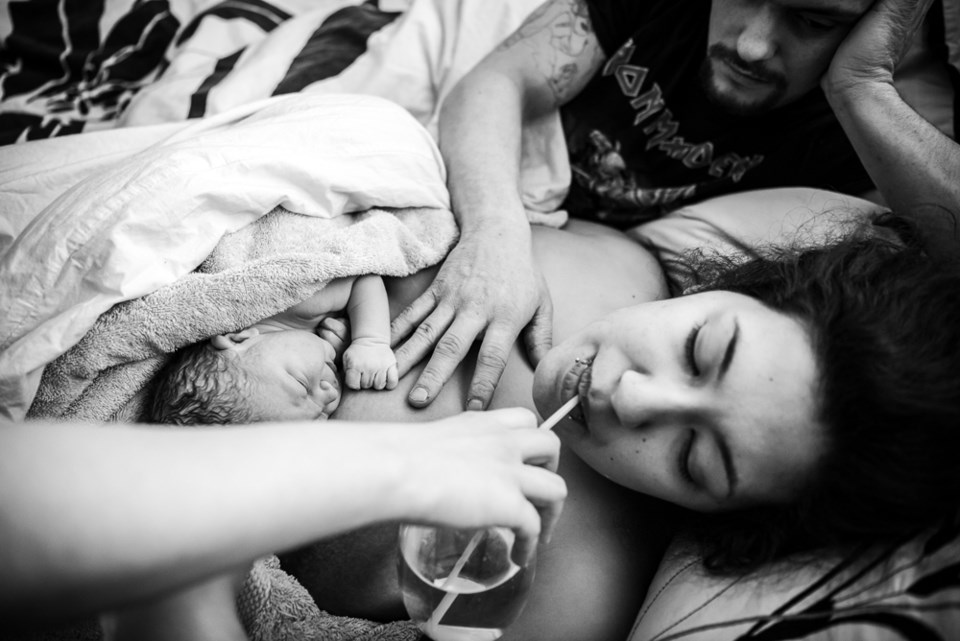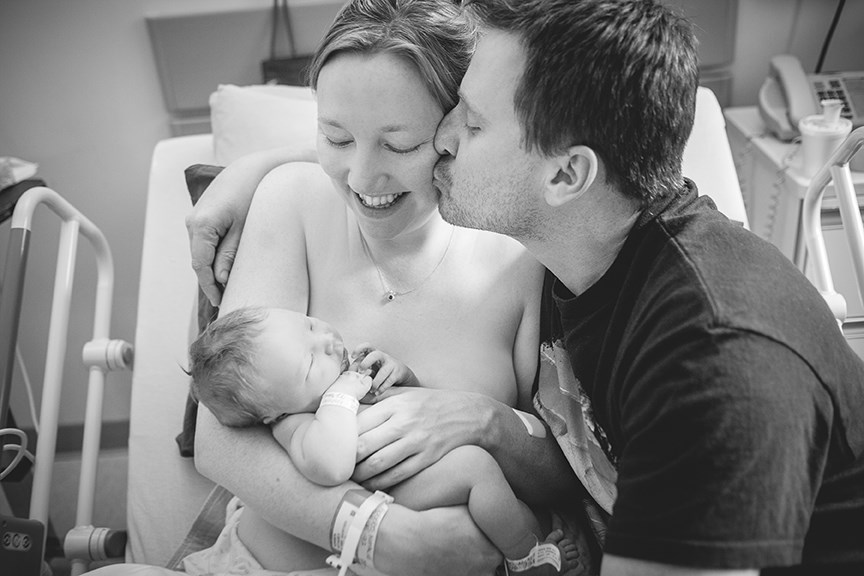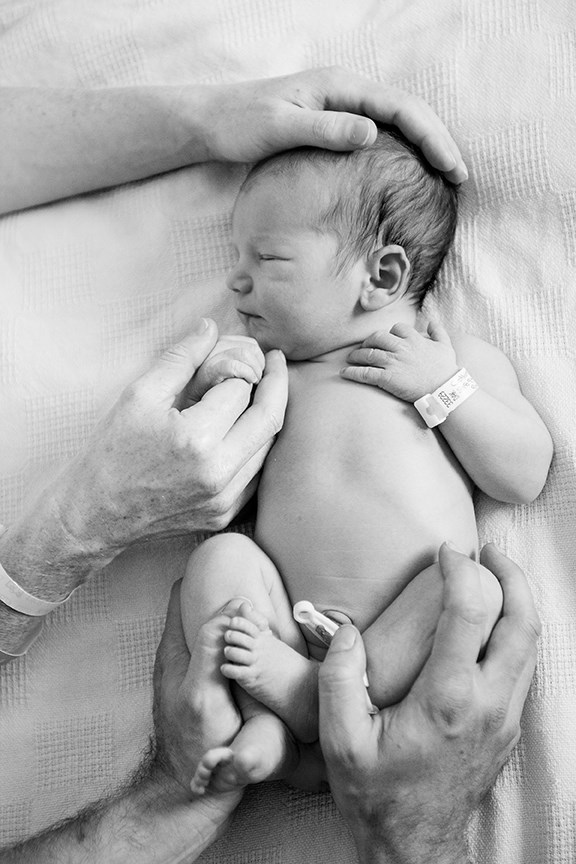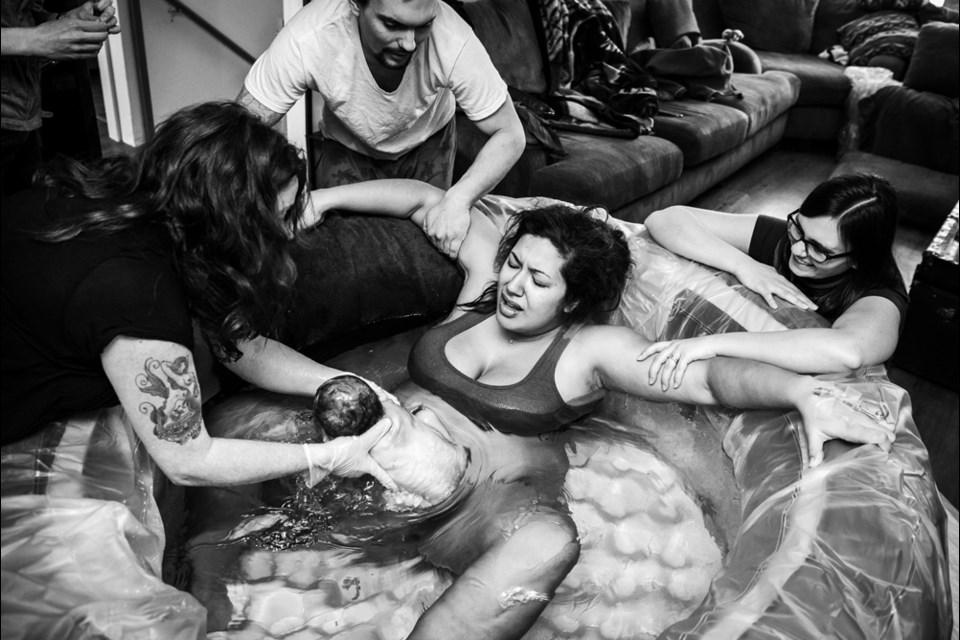Calm music plays and, under candlelight, an expectant mother slides into the warm water of her birthing pool.
In the living room, her partner, children, doula, and midwife surround her and, like a fly on a wall, a photographer positions her camera.
Unlike newborn photography — with tiny souls, clean and calm, poured into glass vases and tightly tucked into beds of flowers — birth photography is visceral and vivid; a record of the intensity of childbirth.
Squamish photographer Katia Grondin is one of the few photographers who specialize in this niche style, documenting expectant mothers in active labour — for both home and hospital births — and immediately following birth. She prefers candid to posed photos, capturing the raw experience of childbirth.
“I don’t love shoving babies in baskets and all those really weird poses they wouldn’t naturally do,” she says. “I like to capture the real interactions between parents, babies, and siblings, grandparents, even.”

Because childbirth can be an overwhelming experience for both parents and care providers, she says her clients can find having a dedicated photographer frees them up to focus and be present.
When parents look back at the photos, they remember some of the fleeting moments they’d forgotten in that haze, in that whirlwind of intensity that was their child’s birthday.
“Even though my clients hire me, I always feel like I’m giving them a gift,” she says. “There are all these moments no one would even have known existed until they’re looking back on (the photographs).”
Being able to remind these parents of those moments is what Grondin likes about her job.
“It’s just the gift of the art and the strength and the family aspect, and all the intimate moments,” she says. “It just feels like my purpose. This is my niche of photography, and this is what I’m meant to be doing. A spiritual draw, if you will.”
Two of Grondin’s birth photos recently placed in the top 10 per cent of the international Shoot and Share photography contest. Placing high in the birth and newborn category is significant, she says, because she was competing with mostly newborn photos shot in a studio setting.
And although Grondin loves doing birth photography, she knows that it’s not for every expectant mother, and not for every photographer either.
Watching a birth is intense, especially for people who may not understand the process, she says. If you don’t know what steps, movements and sounds are normal, it can be overwhelming, not only for the mother, but also for observers.
The time commitment is significant as well, and may prove difficult for photographers with young families. When she’s on call for a birth, Grondin can’t make major plans or commitments. At a moment’s notice, she’ll have to drop what she’s doing and go.
“It’s completely unpredictable,” she says. “Not a lot of people are willing to commit to that lifestyle.”
Young families make up a large segment of Squamish’s ever-growing population. Whether they want to document the birth itself or wait until things have settled down for a newborn session at home or in a studio, to-be mothers and their families are looking for ways to document the first days of their new baby’s new life.
Squamish photographer Vairdy Frail enjoys birth photography but doesn’t advertise the service because she can’t take on too many of these clients. A lifestyle photographer, she specializes in photography for families, weddings and small business, and babies.
But as someone who has had her own delivery photographed, she understands how significant these images can be for mothers. She wasn’t allowed to have a photographer in the room during her caesarian but was able to hand off her own camera to her midwife who took a few shots when her child was born.

“If I didn’t have those photos, I would hardly even remember what my birth was like,” says Frail. “Photography has that ability in situations that can be high-stress, or there is a lot going on, and you don’t necessarily remember all the little details… I think it can also be therapeutic even, for mothers too, because it can be a traumatic experience.”
Frail more frequently does what’s called “fresh 48 sessions,” an option for mothers who feel having a photographer shoot their birth may be too invasive, but who still want photos taken shortly after their baby is born.
“To not be there for the actual physical birth of the baby is much different, but a fresh 48 session is still magical,” she says. “Everyone is just all the sudden slowed down; all these other things you might have been worrying about all the sudden don’t even matter anymore because you’ve got this tiny baby in your arms.”
“It can really feel like the world just shrinks down, and everything that you have is all the sudden right here, right beside you, and nothing else in the world matters.”
Frail doesn’t do much posing with her subjects either, and uses only natural light in her shoots. And while she does take photos of babies by themselves, placed on a bed or on a couch or blanket, rather than putting them in cute poses, she tries to capture meaningful interactions between parents and their new child.
“This little human has been growing inside you for nine months and all the sudden you get to meet this baby, and you get to see what they look like, and all their little fingers and their little toes — all the little details about them — and just how much love you have for them and just how overjoyed you are to finally meet them… that connection that the parents have with the baby,” she says.
And newborn photography, like birth photography, captures a very short, yet important time of life.
“They grow up so fast, and they change so quickly,” says Frail. “Even after the baby’s three months old, the parents are often going to look back on that newborn stage, and it might almost seem like a blur.”
“To have images from that small, little, fleeting time to look back on, I think is really important.”
In childbirth — wherever it happens — time moves slowly, and quickly, and stands still.
A mother squeezes her partner’s hand and cries out in pain in a hospital room. Doctors and nurses tell her to push, among beeps and flashing lights, watching the movements of her labour.
A woman stands back and to the side, mindful of the space she occupies, unnoticed, watching, and raises her camera.





